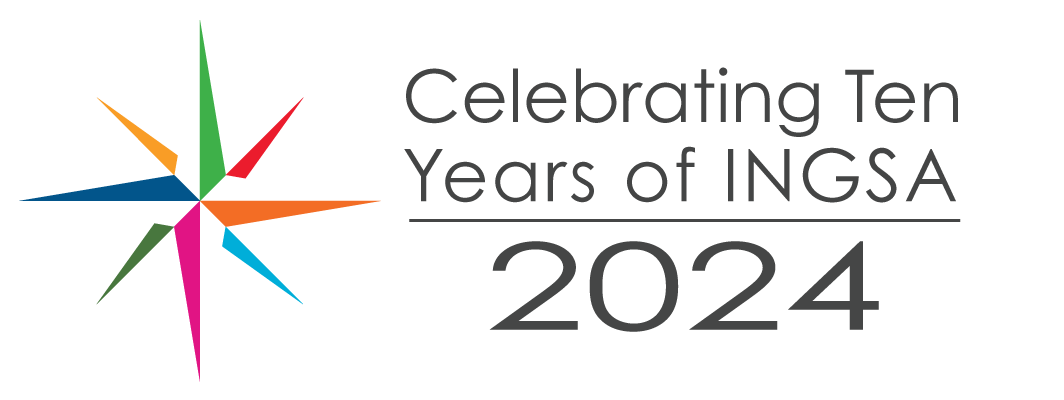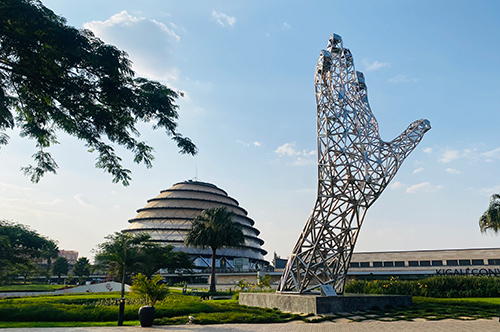
About the conference…

INGSA2024 – The Transformation Imperative:
Expanded Evidence for Inclusive Policies in Diverse Contexts
INGSA2024 is in the early stages of planning. As such, this information will expand and evolve as we draw closer to the event, so please check back regularly or join the INGSA network for free to receive updates directly!
DRAFT Concept Note
For more detail on the Themes and Aims of the conference you can see the Draft Concept Note here. This will be updated as the conference takes shape. It also provides important thematic underpinning for anyone considering proposing a Session or a Satellite Event in current Open Call (see below).
Conceptual Topics of INGSA2024
INGSA2024 will be structured around three Conceptual Topics, below. For more detail see the Concept Note.
Transformation:
There is no doubt that global communities are now compelled to address large-scale transformations in our socio-ecological and socio-technical systems if we are to curb the worst effects of climate change and inequalities. Thus, as the framing of issues and the remit of science advising moves beyond just technical diagnoses and solutions to discrete policy problems, and towards broader and more complex transformative approaches, how will this shift change the principles and practices of science advice?
Expanded Evidence:
Science advice for transformation of socio-ecological and socio-technical systems must assist decision-makers to parse and manage the interconnected, multi-level, transboundary and often deeply polarising problems that societies face. To do so means transcending conventional definitions and boundaries to expand and apply broader evidence from across cultures, languages, demographies, geographies, ideologies, epistemic traditions, and geopolitical alliances, to name a few.
Inclusion:
The world is experiencing a crisis of trust. Trust in the institutions of governance, the institutions of knowledge, and in the relationship between these has eroded in recent years for all sorts of reasons. Observers and experts have identified numerous drivers and conditions, but it is generally now agreed that diverse audiences must be included in the processes that affect them for their trust in institutions – and the social cohesion this brings – to be (re)built and maintained. In turn, the shared values and civic reason generated can underpin and perpetuate trust in institutions.
To help ensure that these topics are explored through a range of useful lenses, we propose that sessions consider some Key Dimensions – that of Structures, Skills, or Solutions. More information is available in the Draft Concept Note.

Conference Sponsorship
Would your organisation like to sponsor the world’s leading conference at the intersection of evidence, public policy, and society? Knowledge-to-policy structures, capacities, and capabilities, are more important than ever. Decision-makers across all sectors are called upon collectively to effect societal transformation and resilience, and to repair planetary systems in fair and efficient ways. Assisting in this effort, INGSA conferences have been at the forefront of the debate, foresight, and direction-setting.
You can be part of this work, while also giving a platform to some of Africa’s fastest rising stars who are leading the way in societal and technological transformations.


Conference Logistics
INGSA2024 will be open to 500 delegates from around the world. Information about how to express your interest in receiving an invitation will be available soon. Invitations will be issued as a matter of priority to those participating in a selected conference session or satellite event, but we are expecting a lot of interest in the conference, so watch this space!
As with previous conferences, there are no costs for registration but attendees and speakers need to cover their own travel and accommodation. A limited number of travel bursaries will be made available to support delegates from across Africa and the Global South.
To be the first to find out when Expressions of Interest open, make sure you join INGSA for free!

Programme Committee
INGSA2024 would like to thank all the members of the conference Programme Committee for their time, interest, and insights. The Programme Committee for INGSA2024:
- Prof Remi Quirion – President of INGSA
- Ms Kristiann Allen – Executive Secretary of INGSA
- Dr Rhona Mijumbi – African Evidence Network
- Prof Mahouton Norbert Hounkonnou – Network of African Science Academies (NASAC)
- Dr Lassina Zerbo – Emeritus executive Secretary of the CTBTO
- Dr Temilade Sesan – Adjunct Lecturer, Centre for Petroleum, Energy Economics and Law, University of Ibadan
- Mr Mike Hughes – Former advisor to the Ministry of Education, Rwanda
- Prof Alfred Bizoza – Team Leader, INGSA-Africa Hub Rwanda
- Dr Cathy Foley – Chief Scientist of Australia
- Dr Mona Nemer – Chief Science Advisor to the Government of Canada
- Prof Charlotte Watts – Chief Scientific Adviser and Director for Research and Evidence, UK Foreign, Commonwealth & Development Office
- Dr Eva Liliane Ujeneza – Co-Chair, Rwanda Young Academy of Science
- Dr Heide Hackmann – Director, Future Africa, University of Pretoria
- Mr Daan du Toit – Deputy Director-General: International Cooperation and Resources at South African Department of Science and Innovation
- Prof Asma Ismail – Professor Emerita, Academy of Sciences Malaysia
- Ms Kana Asano – Chief of S&T Diplomacy Group, Japan Science and Technology Agency
- Dr Chagun Basha – Chief Policy Adviser, Office of the Indian Principal Scientific Adviser- Policy Analytics & Insights Unit
- Prof Sujatha Raman – Director of Research, Australian National Centre for the Public Awareness of Science
- Dr Alan Bernstein – President Emeritus, Canadian Institute for Advanced Research
- Mr Naser Faruqui – Director of Education and Science, International Development Research Centre
- Prof Tarmo Soomere – President, Estonian Academy of Sciences
- Dr Pedro Conceição – Director, Human Development Report Office, UNDP
- Dr Toby Wardman – Head of Communications, SAPEA
- Mr David Mair – Head of Unit, European Commission Joint Research Centre
- Dr Jan-Marco Mueller – Coordinator for Science Diplomacy and Multilateral Relations, European Commission, DG Research and Innovation
- Amb Alexandre Fasel – State Secretary, Swiss Federal Department of Foreign Affairs
- Prof Tolu Oni – Global Diet and Physical Activity Research Group, MRC Epidemiology Unit, University of Cambridge
- Prof James Wilsdon – Professor of Research Policy, UCL-STEaPP
- Prof Sir Peter Gluckman – President, International Science Council
- Dr José Manuel Restrepo – Rector, EIA University, Colombia
- Dr Sudip Parikh – Chief Executive Officer, AAAS
- Prof Cassidy R. Sugimoto – Professor, School of Public Policy, Georgia Institute of Technology
- Mr Thierry Damerval – President and CEO, French National Research Agency


